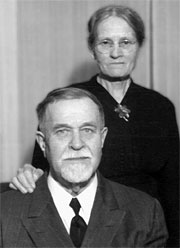
No. 32, Fall 2005
Abram H. Unruh: “A Model Teacher and Preacher”
Abram H. Unruh was one of God’s gifts to the Mennonite Brethren Church. The first part of his life was spent in Russia, the second half in North America. He taught and preached in Mennonite churches for over 65 years.
Abram was born in 1878 in the Crimea in southern Russia. At the age of 5 Abram’s father died, leaving a family of ten children. Since the Unruh’s were poor, Abram was separated from the rest of the family and went to live with his uncle Cornelius in the Molotschna.

Abram and Katharina Unruh
At twelve Abram enrolled in secondary school in Ohrloff. After completing secondary school he enrolled in the teacher’s college in Halbstadt and began teaching in an elementary school in Menlertschik, Crimea.
After a profound spiritual struggle, Abram committed his life to God. He received baptism at the Mennonite Brethren Church in Spat and before long was asked to preach. He also soon fell in love with Katharina Toews, a young woman who had a lovely voice and sang in the church choir. In 1900 Tina (as he called her) became his wife.
During the years that Abram taught in the Crimea he took courses in Simferopol and Perekop and attended teachers’ conventions to improve his teaching skills. He began to read widely in theological and devotional literature. After eight years of teaching in Menlertschik, he accepted an invitation to teach at a post-secondary school in Barwenkowo, in the Ukraine. Here the Unruhs experienced the death of their two-year-old daughter, Elizabeth, and later they lost their four-year-old son, Cornelius. These tragic events only brought the Unruhs closer to God.
When World War I broke out, Unruh entered the Russian Red Cross. Instead of serving on hospital trains he was asked to serve in an office in Odessa. After the war the country sank into anarchy and when anti-German sentiments increased, the Unruhs decided to return to the Crimea, where Abram become principal of the school in Karassan.
By now Unruh was known as a gifted expositor of the scriptures and was ordained to the ministry. In Tschongraw, Johann Wiens, a returned missionary from India, had established a Bible school and asked Unruh to join the faculty. Students from all over Russia attended this training school. Unfortunately, after six years, the Soviets closed the school.
Because of the political and economic turmoil in Russia, the Unruhs decided to leave the country. With four sons and two daughters they arrived in Canada in 1925, settling in Winkler, Manitoba. By the end of the year Unruh began his Bible teaching ministry with 13 students. This was the beginning of the Winkler Bible School. Eventually all of the Tschongraw faculty members arrived in Canada and joined Unruh in this venture of faith. Unruh was principal of this school for 19 years. A great many pastors and missionaries received training in the Winkler Bible School.
In 1944 the Canadian Mennonite Brethren Conference established a Bible college in Winnipeg, and Unruh, at age 67, was asked to be its first president. The Mennonite Brethren Bible College was to have a profound influence on the churches of the Mennonite Brethren Conference. Many pastors, missionaries, Bible teachers, musicians and other church workers were trained at the college.
Unruh was refreshingly human. He had his weaknesses and apologized quickly when he sensed that he had offended someone. People were impressed with his great gifts, his deep devotion to God, and also with his delightful sense of humor. To this day former students still quote some of his profound and witty sayings.
In the field of theology, Unruh was largely a self-taught man. He never attended seminary, but he read widely all his life and was amazingly balanced in the great truths of the Christian faith. Bethel College, Kansas, paid tribute to his gifts and his ministry by bestowing an honorary doctorate of divinity on him.
Unruh was tall and rather corpulent, and with his neatly trimmed beard and mustache, he cut a patriarchal figure. His seemingly inexhaustible store of energy and his strict work habits enabled him to carry a full teaching load, to preach almost every Sunday, and to conduct numerous Bible conferences throughout North America. His sermons and lectures were always well organized and easy to follow. He wrote out his sermons in longhand, but only took an outline into the pulpit.
Unruh also participated actively in Conference boards and was moderator of the Canadian Conference. He served on the board of Tabor College, Kansas, produced masses of Sunday school material, and visited churches to raise the level of Sunday school education. His major literary work was his Geschichte der Mennoniten Brueder Gemeinde (History of the Mennonite Brethren Church).
The Unruhs eventually retired to Chilliwack, BC. By then Abram was suffering from diabetes and was losing his eyesight.
Unruh had hoped to attend the centennial celebration of the Mennonite Brethren Church held in Reedly CA in 1960, but it was not to be. At Christmas in 1960 he preached his last sermon on the topic, “We Beheld His Glory” (John 1:14). As he began his sermon, he lapsed into a coma and passed away a few days later at the age of 82.
In many ways Unruh’s passing marked the end of a generation which had grown up in Russia and had provided stable and creative leadership for the youth of the first generation of Canadian-born Mennonite Brethren leaders.
